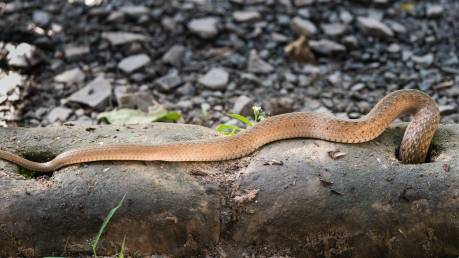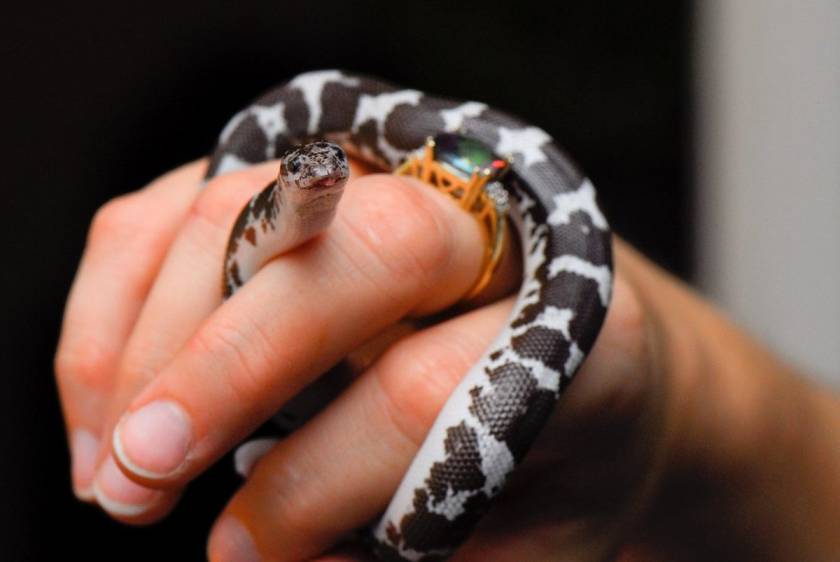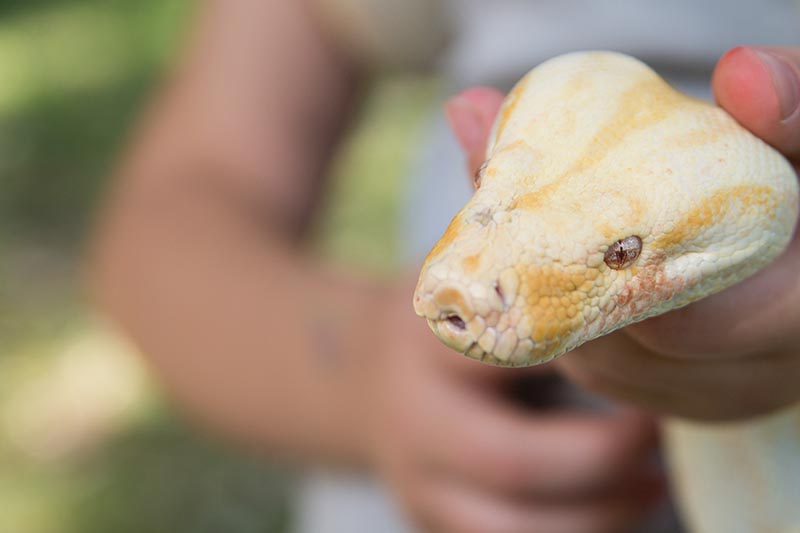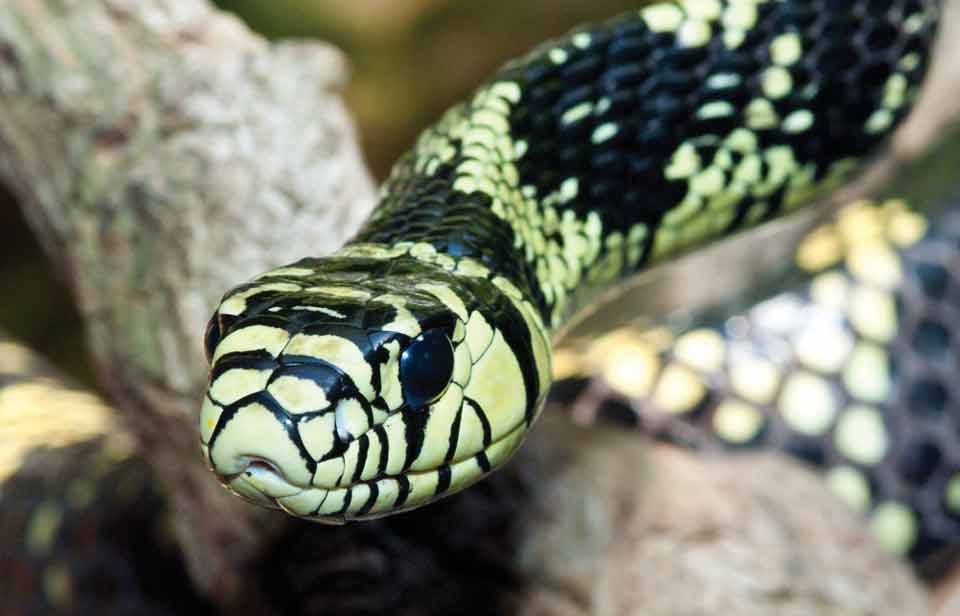Connect with a verified veterinarian in minutes. Licensed vets are available 24/7 to answer your questions. No need to worry about your furry family member.
Have you noticed some holes in the yard? Are you worried they could be snake holes? If so, then you’ve come to the right place.
In this article, we’ll take a look at why snakes may be inhabiting your yard and/or home, what snake holes look like, and what to do about snake holes. Let’s get started!
Why are Snakes Living in My Hard or Home?
Just like other types of animals, snakes are drawn to environments where they can find shelter and food. Many snakes eat small rodents, birds, frogs, insects, and more. If you have any of these in the yard and near your home, eventually, you may have a snake take up residence.
Snakes will look for shelter in many places around a yard or in the home. They may be drawn to piles of rubbish such as leaves, dirt, and other debris in the yard. If a snake can find a crack or gap somewhere in your home, they may slide right in! They’re looking for a warm, dry place to live and possibly lay their eggs. And why not, when a great food source is nearby?
What are Snake Holes?
Sometimes a snake will find a burrow left by another animal. This may make a great home for the snake. The hole is in the yard, protected, and near the snake’s food.
Snake holes may be round and will vary in size. The holds are in the ground and may resemble holes made by moles. This means the snake hole may be located deep in the grass. While that’s true, snakes may also take up residence in an old hole in a tree or even in large concrete cracks.

Review symptoms, medications & behavior to keep your pets healthy with a Vet Online in just minutes.
Ask a Vet Live NowHow Can You Tell if a Snake is Living in the Hole Now?
If the snake hole is uninhabited, then you may notice these signs:
- No signs of shed snakeskin
- No signs of snake feces
- Debris around the hole and spiderwebs in the hole’s entrance
What are the Signs the Hole Belongs to a Snake?
It can be difficult to say if a hole belongs to a snake or not. If you don’t see the snake itself, you may see signs that a snake is living there. For instance, you may find a shed snakeskin near the hole. This is because snakes shed their skin as they grow.
Another way to tell if there’s a snake living in the hole is to check the area for snake feces. You may notice feces that have traces of the snake’s prey, which can include hair and bone pieces. In addition, snake feces are usually thick, pasty, dark brown with a chalky white bit at the end.
What to Do If You Find a Snake Hole in the Yard?
The idea of a snake crawling around the yard can be unsettling. The first thing you worry about is that the snake could be venomous. However, in the US, there are only about four types of venomous snakes, including:
- Cottonmouths
- Rattlesnakes (several different types)
- Copperheads
- Coral snakes
In most cases, if there’s a snake living in the hole, then it will be a non-poisonous snake. Remember, snakes are beneficial to the environment. They eat harmful insects and other pests; if you remove the snake from the yard, chances are you’ll soon have another problem with too many pests.
However, if you live in an area with poisonous snakes, then you need to be careful of what type of snake may be living in the hole.
If you decide to do something about the snake, then remember to use extreme caution. Any snake that feels cornered or threatened can bite, even those that are not venomous.
What to Do About Snake Holes
There are several things you can do if there’s a snake living in your yard.
1). Have the Snake Removed
Here, we don’t mean a pest control company. Instead, what we’re referring to is calling a wildlife professional or a wildlife organization for assistance in trapping and removing the snake. In these cases, the wildlife professional will catch the snake and them remove them to a safer area.
This is a great option as it does not involve killing the snake. Snakes are a part of the natural environment and are beneficial for keeping pests under control.
2). Covering the Hole
Please understand that dealing with a snake hole, unless you’re experienced or a professional, can be dangerous. Consider this from the snake’s perspective. You mind your own business, sheltering in your home when all of a sudden dirt or stones come raining down on your head. What would your reaction be? This could be the reaction of the snake—it could all of a sudden pop out of the hole, determined to defend its home!
In this case, you could be bitten. This could be dangerous if you’re dealing with a poisonous snake. So, please bear this in mind if you choose to deal with the snake hole on your own.
It’s possible to fill in the hole with dirt or gravel. Another option is to cover the hole with burlap, fine wire mesh, and more. Now, keep in mind that if you don’t do a good job of filling in the hole, you could be reinforcing it and improving it as a home for the snake.
This is especially the case if using large rocks to cover the snake hole. You may leave a small gap or crevice, which is just enough to allow the snake entry to his home. And the end result is a home that’s now more like Fort Knox and more protective of the snake.
So, be careful when covering or filling in a snake hole.
3). Call Pest Control
This method is best if you’re dealing with a poisonous snake that could be dangerous for you and your family. If a wildlife professional isn’t able to come out to remove the snake, then this may be your only safe option.
Professional exterminators have the training and knowledge to safely deal with poisonous snakes. They’ll also be able to offer advice and guidance on how to keep your yard and home from being favorable habitats for snakes.
When all is said and done, remember that snakes are beneficial to the environment, which includes near your home. However, living with venomous snakes in and around your home can be extremely dangerous. In that case, the best option is to have a wildlife professional or pest control deal with the problem.
On the other hand, if the snake in your yard is non-poisonous, then maybe you can live with them peacefully. Just be sure to patch up all crevices, holes, and gaps in your home to keep the snake out in nature, where he belongs!
Connect with a verified veterinarian in minutes. Licensed vets are available 24/7 to answer your questions. No need to worry about your furry family member.

Tom
Tom has always loved to write since he was little - he wanted to be either a writer or a veterinary doctor, but he ended up being a professional writer while most of his works are based on animals. He was born in San Francisco but later moved to Texas to continue his job as a writer. He graduated from the University of San Francisco where he studied biotechnology. He is happily married and a soon to be father!
Review symptoms, medications & behavior to keep your pets healthy with a Vet Online in just minutes.
Ask a Vet Live Now




